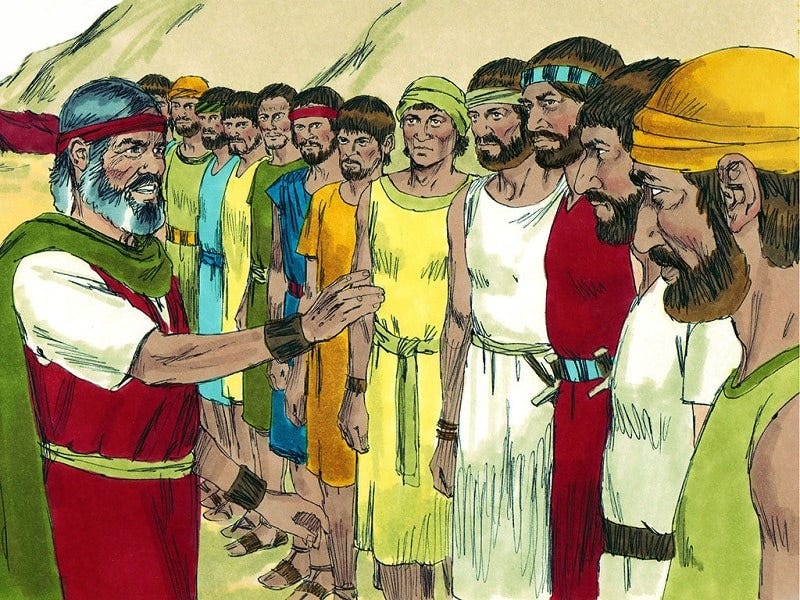'Anyone who is afraid should go home': Cowardice is contagious. Will you stop the spread?
Fear spreads as fast as lies. Faithfulness takes real effort.
“Announce to the people, 'Anyone who is afraid should go back home, and we will stay here at Mount Gilead.'" So 22,000 went back, but 10,000 stayed.” — Judges 7:3
A fighting force that started out 22,000 strong was only 300 men by the time Israel fought the Midianites, in Judges 7.
Israel was being given a homeland it did not build, but would have to clear-cut the opposition itself — God willing.
So why bring only 300 men into battle against Midian?
As ever, God wanted the credit. God wanted Israel’s success to be unmistakably a blessing from their Lord, not something men could have done for themselves.
The Lord said to Gideon, “You have too many men for me to deliver Midian into their hands. In order that Israel may not boast against me that her own strength saved her,” reads Judges 7:2. Then came the announcement that 22,000 men would be cut down to 10,000.
But going from 10,000 to the 300 who fought Midian was an even bigger cut.
God had Gideon bring the men down to the water, and turned those waters into a proving ground.
“Separate those who lap the water with their tongues like a dog from those who kneel down to drink,” God tells Gideon in Judges 7:5.
God didn’t want mere men, or many men, to fight this battle.
He wanted men with the fervency and the thirst of dogs to fight this battle.
Only the fervent. All others can stay home, or would be told to go home.
Tummy ache? Stay home.
Scared? Stay home.
Kneel slowly down for a drink, rather than lap from the waters as if they give life? Go home.
Novel idea: If you’re afraid, stay home, or go home.
We could have used that piece of wisdom in 2020, when the world locked down in fear of COVID-19.
Life is not a one-size-fits-all endeavor, and never was.
If there is one essential truth of the 2020s, it’s that cowardice is contagious. Fear, when spoken aloud, promotes overthinking and timidity.
We spend all day online listening to people talk about their fears, their dislikes, and their pet peeves. Then we add in our own. You think this doesn’t affect you?
It does affect you.
Numbers 13 shows what happens when the fearful have the loudest voice in the room.
Moses sent advance scouts to Israel’s someday homeland, to take a look and bring back a report.
Some people might see the upside of a new homeland. But the scouts focused on the obstacles.
“We want into the land to which you sent us, and it does flow with milk and honey!” the scouts report in Numbers 13:27. “Here is its fruit.”
“But,” they add in the next verse, “the people who live there are powerful, and the cities are fortified and very large.”

Numbers 13:32 tells that the scouts “spread among the Israelites a bad report about the land they had explored.” Again they focused on the seemingly impossible size of their new neighbors.
The Israelites spend the night worrying, and by the next chapter they “grumbled against Moses,” going back to the old trope that they were better off in Egypt than wandering the desert.
(The story of David and Goliath is a direct addressing of the idea that Israel’s enemies were too big to beat. If its foes were large, the parable of 1 Samuel shows, the Israelites were brave, and smart.)
The scouts’ cowardice was contagious. It spread in just one night. Only a few men had actually seen the giants. But now everybody was scared of them.
By comparison, it took Moses 40 years of preaching faithfulness to prepare Israel for its new home. Even in his farewell address, Moses was sure Israel would screw things up when it got there.
In Deuteronomy 9:4, Moses tells Israel: “After you find success, do not say to yourself ‘The Lord has brought me here to take possession of this land because of my righteousness.’”
When a friend has a new business idea, do you see the upside, and how it could work?
Or are you the one who says: What about insurance? What about renting the building? Payroll? Isn’t it just too much risk?
Do you see opportunity and upside? Or do you see downsides and preach fear?
Does your mind default to best-case scenarios, or worst-case?
Preaching fear is a choice. How many preachers of fear exist in your life? Are you one?
And what would faith look like instead?





Thank you! I needed this message. I am struggling with a decision to really involve myself in something many people would feel is controversial but something I feel strongly about. Having the bravery to be rejected by those we love. Your messages do a great service my friend. Thank you again!
You do not light a lamp and set it under a bushel.